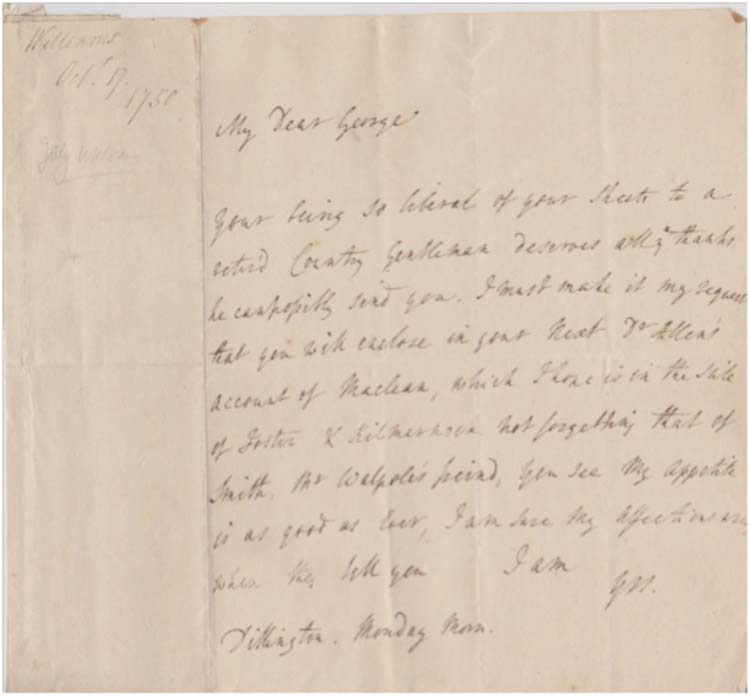

1. From George, 1st Lord Lyttleton.
2. From Rev John ‘Orator’ Henley.
5. From George James (‘Gilly’)Williams..
8. From Madame La Marquise de Stainville.
9. From Charles Townshend, n.d..
15. From Mr. Rogers
Selwyn 5: From George James (‘Gilly’)Williams.
Williams with Selwyn, Richard Edgecumbe and Horace Walpole made up a group who met at stated periods in the year at Strawberry Hill, Walpole's House. The four members of the group were close comrades and very influential members of 18thC society.
George James Williams, known familiarly as Gilly Williams (1719 to 1805) was an English official, known as a wit and letter writer. Through the influence of Lord North, he obtained on 8 November 1774 the post of receiver-general of excise, which he held until 1801. He also met his friends for "wit and whist" in Selwyn's Thursday Club at the Star and Garter in Pall Mall. He dropped out of his old circle, and little is heard of him after 1770. He died in Cleveland Court, St. James's, near the house where his friend Selwyn had lived, on 28 November 1805.
James Foster (Baptist minister) supplemented his ministry with the newly established Sunday evening lecture at the Old Jewry. By 1744 he was pastor of the Independent congregation at Pinner's Hall. The rebellious Earl of Kilmarnock declared himself a presbyterian, and was given the sacrament by Foster whilst he was imprisoned in the Tower of London and who also attended his execution. Foster published an Account of Kilmarnock's behaviour in 1746,
Adam Smith (16 June 1723 to 17 July 1790) was a Scottish moral philosopher, pioneer of political economy, a key Scottish Enlightenment figure and friend of Walpole. Smith is best known for two classic works: The Theory of Moral Sentiments (1759), and An Inquiry into the Nature and Causes of the Wealth of Nations (1776). The latter, usually abbreviated as The Wealth of Nations, is considered his magnum opus and the first modern work of economics. Smith is cited as the "father of modern economics" and is still among the most influential thinkers in the field of economics today

The letter reads:
"My Dear George
You being so liberal of your sheets to a retired Country Gentleman deserves all thanks he can possibly send you. I must make it my request that you enclose in your next Dr Allen's account of Maclean, which I hope is in the stile [sic] of Foster & Kilmarnock not forgetting that of Smith, Mr Walpole's friend. You see my appetite is as good as ever. I am sure my affections truly [?] when they tell you I am
GW
Dillington Monday Morn"